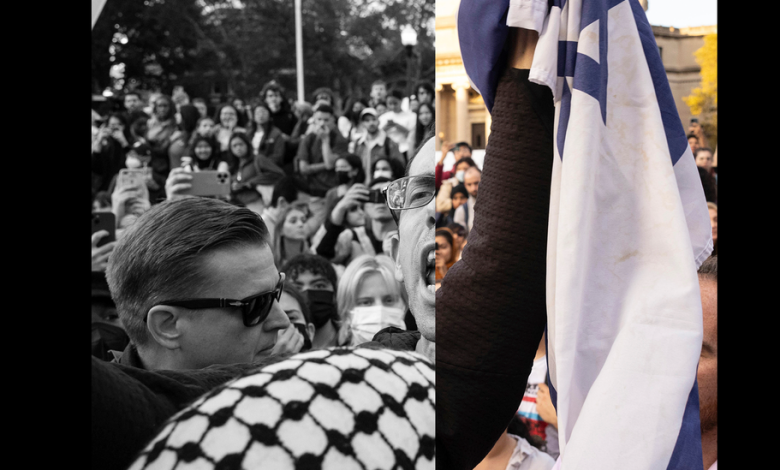The Conversations About the War in Gaza We Ought to Be Having

The conflict in Israel and Palestine has thrown American campuses and society into turmoil.
We are both deans of public policy schools. One of us comes from a Palestinian family displaced by war. The other served in Israeli military intelligence before a long career in academia. Our life stories converged when we were colleagues and friends for 10 years on the faculty of Princeton University. Notwithstanding our different backgrounds, we are both alarmed by the climate on campuses and the polarizing and dehumanizing language visible throughout society.
Universities should state hard truths and clarify critical issues. As leaders of public policy schools, we train the leaders of tomorrow to think creatively and boldly. It starts with countering speech that is harmful, modeling civic dialogue, mutual respect and empathy, and showing an ability to listen to one another.
Universities should not retreat into their ivory towers because the discourse has gotten toxic; on the contrary, the discourse will get more toxic if universities pull back.
Faculty and students on some campuses across the country have reported feeling unsafe in light of verbal and physical attacks. Activist groups and even student groups are screaming past one another instead of listening and engaging with the other side. The polarizing talk in media, political and campus circles create an environment lacking in sophistication and nuance.
For example, chants like “From the river to the sea, Palestine will be free” are commonly perceived as calls for the annihilation of the state of Israel. What’s more, the position these chants represents completely ignores the fact that the majority of Palestinians have rejected this stance since the 1993 Oslo Accords, and leaders of the Palestinian Authority in the West Bank have consistently called for a two-state solution. Furthermore, the claim that all Palestinians in Gaza are responsible for Hamas lacks empirical support.
Condemnation of the Oct. 7 massacre of Israeli civilians by Hamas — and calling it out as an act of terrorism — shouldn’t be avoided out of risk of offending Palestinians and their supporters. Not condemning the terrorist attacks is a failure of a moral core, and by no means should condemnation of terrorism be viewed as incompatible with believing in Palestinian rights and statehood, alongside Israel. Terrorism is, by common understanding, an attack on all humanity.
We teach our students to deal with policy predicaments that start with tough questions that require understanding opposing ideas. The uncertainty about what the future of Gaza will look like, whether the peace process can be revived and how the security and safety of Israelis and Palestinians will be achieved — these are, to be sure, hard questions with solutions that do not fit on placards.
While campus groups and all Americans enjoy freedom of speech, educators at universities must respond to speech that is harmful, hateful, untrue or lacking nuance and historical context. Free speech only works when there is vigorous counter speech.
As deans, we also know that in this volatile political environment, we must ensure that our campuses have places where each side can air their opinions and even come together and hold difficult conversations without fear of retaliation. Examples of this include webinars that our respective schools held in the wake of the attacks featuring a diversity of voices, including academics and policymakers, Israelis and Palestinians, Democrats and Republicans. That must start with the core element of civic engagement and civil disagreement.
Campuses must protect free speech, but equally advocate for mutually respectful dialogue. That obligation is both especially important and especially demanding in our current political and societal landscape.
A discussion of the actions that states should take in self-defense is worth convening, as well as one on the conduct of warfare in a dense urban environment. Israel’s response should be directed at eliminating the threat posed by Hamas, not at innocent civilians in Gaza. What that means in practice is a matter for debate. Calling out Israel for its bombing of civilian areas in Gaza shouldn’t be avoided out of risk of offending Israelis and their supporters.
There is no better place for these discussions than a university campus. But sponsoring this kind of debate takes courage.
As educators, we at times have to make our students uncomfortable by challenging their preconceptions and encouraging them to think through their positions using data, evidence and logic. It is unrealistic to believe that individuals can put their emotions away. But if a university doesn’t encourage students to reflect on how their own emotions shape, and occasionally distort, their analysis of the world around them, where else could they possibly learn this?
Even prior to the current violence, the Arab-Israeli conflict was an intensely uncomfortable topic to discuss, and, unfortunately, some schools may try to solve that problem by omitting it from their curriculums. Journal editors may be wary of wading into such hotly charged topics. This gap has left an intellectual vacuum filled by hate speech, antisemitism, Islamophobia and other stereotypical tropes on campuses and crowded out rigorous empirical analysis and reasoned discussions. Add to that a polarized media establishment, political landscape and social media, and no wonder we’ve seen the conversation on campus devolve into a verbal war of platitudes and talking points.
We remain hopeful, however. Over the past few weeks, we’ve also witnessed a vibrant student body eager for more information around these issues.
Universities play a vital role in shaping the conversation. Polls show that universities still enjoy a higher level of trust by the public than many other institutions, although it is dwindling. We have unique access to the world’s best intellectual minds and financial resources to support them.
We will squander this trust and legacy if we stay on the sidelines.
Amaney Jamal is the dean of the Princeton School of Public and International Affairs, Edwards S. Sanford professor of politics, and professor of politics and international affairs at Princeton University. Keren Yarhi-Milo is the dean of Columbia University’s School of International and Public Affairs and the Adlai E. Stevenson professor of international relations.
The Times is committed to publishing a diversity of letters to the editor. We’d like to hear what you think about this or any of our articles. Here are some tips. And here’s our email: [email protected].
Follow The New York Times Opinion section on Facebook, Twitter (@NYTopinion) and Instagram.




